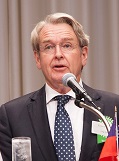Current Status and Future Prospects of the Australia-Japan Relationship
September 20, 2017
H. E. Mr. Richard Court AC
Ambassador of Australia to Japan
 ��It is a great honor and privilege for me to speak at Tokyo Rotary Club today. Since we arrived in Tokyo at the beginning of this year, my wife and I have been overwhelmed by the warm welcome we have received, which is a testament to the close people-to-people ties between Japan and Australia.
��It is a great honor and privilege for me to speak at Tokyo Rotary Club today. Since we arrived in Tokyo at the beginning of this year, my wife and I have been overwhelmed by the warm welcome we have received, which is a testament to the close people-to-people ties between Japan and Australia.
��Rotary is an International Service organization which strives to help build a better world through collaborative efforts by business and professional leaders. It has made remarkable achievements in providing humanitarian services, encouraging high ethical standards and advancing goodwill and peace.
��In Australia, Rotary is the largest independent funder of medical research, including mental health. It also provides a broad range of scholarships for rural medical and nursing students as well as indigenous health students to support their successful research.
��Today, I would like to talk about another great success story that helped build a better world. It is a story of the Australia-Japan relationship since the end of World War II. I cannot think of a better example of two countries working out their differences and becoming great friends. I can also speak from a very personal family experience.
��My father was a soldier, an officer in World War II fighting the Japanese in Bougainville, New Guinea. When he became a Minister in the Western Australian Parliament in the late 1950s, he negotiated the iron ore agreements with the Japanese steel mills which played a critical role in the success of Japanese industry today. By the late 1960s, Japan was our largest export market for Australian iron ore, coal and then LNG that helped build modern Japan. My father dealt directly with many Japanese Prime Ministers and senior business leaders.
��During my own eight years as the Western Australian Premier and Treasurer, we were able to build on these foundations. Across Australia, our trade has diversified into education, tourism, infrastructure, financial services, medical research and much more. Trade and investment has been followed by close cultural, defense and strategic ties, all built on trust and respect that was hard-fought over more than sixty years.
��Today our bilateral relationship is the envy of the world. We should not forget that it was Japanese companies that underwrote the development of the world��s most competitive mineral and energy sectors in Australia. Australia can boast the world��s largest tonnage railway systems, massive bulk cargo ports and LNG facilities that utilize pioneering technologies. Australia also helps feed Japan, ranging from beef to barley for breweries, wheat for Udon noodles and much more.
The Japan-Australia bilateral relationship is a story we can be very proud of. It is a story of forgiveness, reconciliation, trust and respect. We have many more positive lessons to learn from our unique culture. Yours is the epitome of politeness, discipline and personal safety. Ours is openness, innovation and frankness, yet I must say in need of a little polishing.
��When we reflect on our friendship, we should be appreciative of those pioneers who laid the foundation for this story. The Commerce Agreement was signed first in 1957, just twelve years after World War II, between Prime Minister Kishi and Prime Minister Menzies. The Joint Declaration on Security Co-operation was signed by Prime Minister Howard and Prime Minister Abe in his first term. The groundbreaking Japan-Australia Economic Partnership Agreement (JAEPA), which came into effect in 2015, remains to date the most liberalizing trade agreement Japan has realized.
��Today, Australia is Japan��s third largest source of imports. Japan is our third largest trading partner. Japan is our second largest source of foreign direct investment, with its total investment equivalent to five times as much as China. On the humanitarian side, our countries help each other when there are natural disasters. The recovery effort after the 2011 Tohoku disaster involved a major contribution by Australian Defense Force and civilians.
��We cannot, however, rest on our laurels. Complacency in any relationship is dangerous. We cannot take our strong relationship for granted. As Prime Minister Menzies himself observed, ��More good things in life are lost by indifference than ever were lost by active hostility��. The onus is on all of us not just to adapt as circumstances change, but to actively seek out new opportunities.
��For our part, the Australian Government is thinking ahead about how we present modern, innovative Australia to Japan. Next year, we will organize a major Australian festival in Japan, called Australia Now. It will include headline performances, cultural and sporting events, specially curated programs and opportunities for dialogue and joint projects. I hope you will all have the chance to participate in some way.
��As I conclude my speech, let me once again thank Rotarians for the important role you all play in Japan at a time of growing uncertainty in our region. Both countries can be rightly proud of what we have achieved with our bi-lateral relationship based on forgiveness, reconciliation, trust and respect. It is surely a great formula for a strong, lasting friendship between our two countries. Thank you.